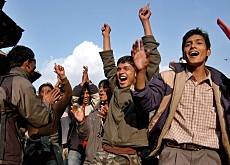Swiss arms monitors upbeat over Nepal’s future

Switzerland's arms monitors in Nepal have hailed the excellent cooperation between Maoist rebels and the Nepalese army in registering weapons.
Two of the eight Swiss monitors taking part in the registration procedure told swissinfo that the verification of the Maoists in the 28 camps as well as the registration of the weapons had gone extremely smoothly.
Swiss monitors Daniel Beyeler and Nicolas Bonvin also said everything was in place to begin with the second phase of the process, which is a key part of last year’s peace deal that brought an end to a decade-long civil war.
Their comments came a few hours before Nepal’s Election Commission announced that it was impossible to hold elections on the scheduled date, June 20, as there was not enough time to complete the necessary preparations.
swissinfo: The first phase of the procedure ended on Thursday, when the registration of the weapons of the Nepalese army was completed. How difficult was it for everybody to give up their weapons?
Nicolas Bonvin: They did not really give up their weapons, as they remain their property. There were no problems and everybody was willing to play the game. The cooperation has been very easy and it was all done in a very friendly way.
swissinfo: Nicolas Bonvin, you were involved in registering weapons both from the Maoists and the army. Was there a difference in the two procedures?
N.B.: There is only one Nepal and the Nepalis are very friendly people and everybody was very willing to help. The army gave up 2,855 weapons, which are as many weapons as the Maoists have handed in. The only difference between the two procedures was that the army weapons were brought by one soldier and the Maoists handed them in individually.
swissinfo: There has been a lot of criticism about the discrepancy between the number of registered weapons and the number of Maoists in the camps. How do you feel about that?
N.B.: The amount of weapons is not really important to us. We receive them, we check them and we put them into containers. As long as they stay inside the containers we are happy. The most important thing is that the peace process is continuing!
swissinfo: What role is Switzerland playing in the process?
Daniel Beyeler: The Swiss Agency for Development and Cooperation has worked in Nepal for over 40 years and the participation of Swiss arms monitors is part of our foreign policy. Switzerland has always had a special relationship with Nepal and we are keen to keep it up.
swissinfo: What are the conditions like in the camps?
N.B.: The camps are not in the best condition and there is still room for improvement but they are a lot better than they were when I started in January. They may not be of the same standards as a Swiss army camp, but they are ok.
swissinfo: What do the Maoists actually do all day in the camps?
D.B.: They get up at 5am to do their morning training. Afterwards they attend English lessons and clean up the weapons. They also play football and 12.5 per cent of the Maoists are allowed to leave the camp at one time – of course without weapons. So there is actually an organised programme for them.
swissinfo: And what will happen to the tens of thousands of Maoists that are currently in the camps?
D.B.: At the moment there is no plan for them, however, once the second registration phase comes into force the number of Maoists in the camps will be reduced, as we will discharge minors and combatants who were recruited after May 25, 2006.
swissinfo: What will the second stage of the registration actually entail?
N.B.: During the second verification phase we will do individual interviews with the combatants and we will collaborate with the United Nations Children’s Fund, Unicef, and the United Nations Development Programme, UNDP, which both have programmes in place for minors. We are not expecting any more Maoists to join or give up their weapons.
swissinfo: Most Swiss households keep at least one weapon. Do you think the Swiss would give up their weapons as easily as the Maoists and the Nepalese army?
N.B.: Switzerland is currently debating whether we should keep weapons at home or not and the Swiss are in two minds about that. I am sure you would find a lot of people who would be very unhappy to give up their weapons.
swissinfo: Daniel Beyeler, do you have a weapon at home?
D.B.: Of course, I have a weapon at home and I am very happy to have it. I think it is a tradition that cannot be changed so easily. Shooting is a very popular sport in Switzerland and once a year 200,000 people get together for a competition. So you have at least 200,000 people who would be against giving up their weapons.
swissinfo: Do you think Nepal is heading in the right direction?
N.B.: I think both sides have done very well and I don’t see why they should not continue to do so. We have two sides that are willing to solve a problem and the fact that they have called on the international community to help them makes me feel very positive about the whole process.
swissinfo-interview: Billi Bierling in Kathmandu
Population of Nepal: 26.3 million.
The Maoist rebels were fighting to abolish the monarchy for ten years. The insurgency left more than 13,000 people dead.
In November last year the seven-party-alliance and the Maoist rebels signed a peace accord paving the way for general elections, which are scheduled for June 2007.
The peace process has been hampered by several uprisings in the south of the country, where the Madhesi ethnic group representing about 40% of the population is fighting for greater rights under the country’s new constitution.
So far, 3,475 weapons have been registered, 2,855 of which remain in containers. The rest of the weapons are retained for perimeter security by designated guards.
The total number of Maoist army combatants registered at 28 cantonment sites, including those from the associated satellite cantonment sites, is 30,852.
The United Nation Mission in Nepal (UNMIN) coordinates the weapons registration in Nepal.
The second phase of the registration process is due to start in the next few weeks.

In compliance with the JTI standards
More: SWI swissinfo.ch certified by the Journalism Trust Initiative











You can find an overview of ongoing debates with our journalists here . Please join us!
If you want to start a conversation about a topic raised in this article or want to report factual errors, email us at english@swissinfo.ch.